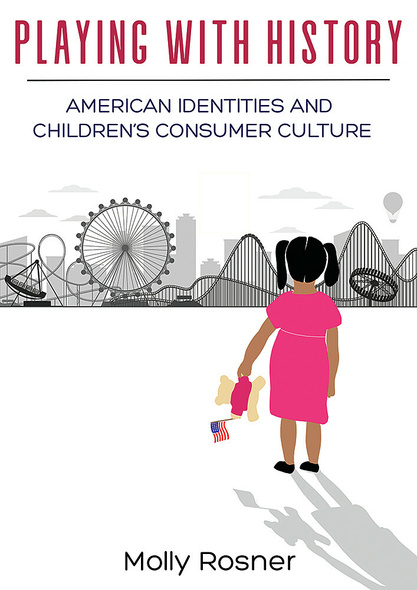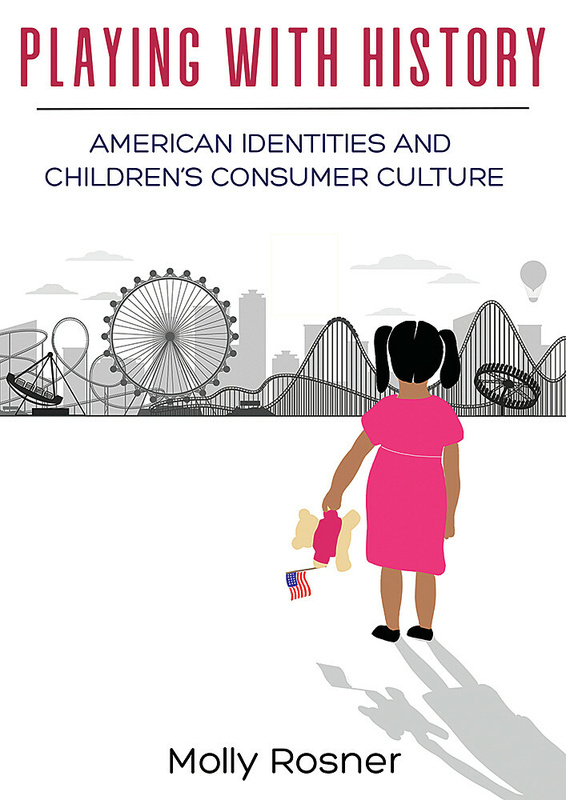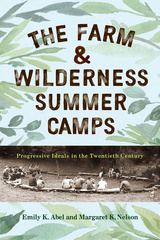
204 pages, 6 x 9
26 b-w images
Paperback
Release Date:14 May 2021
ISBN:9781978822078
Hardcover
Release Date:14 May 2021
ISBN:9781978822085
Playing with History
American Identities and Children’s Consumer Culture
By Molly Rosner
Rutgers University Press
Since the advent of the American toy industry, children’s cultural products have attempted to teach and sell ideas of American identity. By examining cultural products geared towards teaching children American history, Playing With History highlights the changes and constancies in depictions of the American story and ideals of citizenship over the last one hundred years. This book examines political and ideological messages sold to children throughout the twentieth century, tracing the messages conveyed by racist toy banks, early governmental interventions meant to protect the toy industry, influences and pressures surrounding Cold War stories of the western frontier, the fractures visible in the American story at a mid-century history themed amusement park. The study culminates in a look at the successes and limitations of the American Girl Company empire.
Playing with History: American Identities and Children’s Consumer Culture doesn’t just explain the critical messages to children delivered by toys, amusements, and books, it provides a window into twentieth-century American life and the children who grew up receiving those messages—about race, class, and gender. It is both a powerful and an exceptionally interesting work of history. The rich details and the wonderful descriptions make this a pleasure to read.'
Molly Rosner has provided us with a lively and vitally important addition to the historical literature on children, consumerism, and twentieth-century American culture. Perceptive, nuanced, thoroughly researched, imaginative, and beautifully written, Playing with History: American Identities and Children's Consumer Culture will not only appeal to, but inform educators, students, parents, and general readers about the process through which our children have, over the past century, learned what it meant to be an American.'
Molly Rosner’s richly imagined study captures the complicated ways children’s things—toys, trains, dolls, books and a forgotten amusement park—smuggled lessons of history into hours of play and taught generations of white Americans to feel at home in a culture driven by consumption and fractured by class, gender and race.'
Playing with History: American Identities and Children’s Consumer Culture doesn’t just explain the critical messages to children delivered by toys, amusements, and books, it provides a window into twentieth-century American life and the children who grew up receiving those messages—about race, class, and gender. It is both a powerful and an exceptionally interesting work of history. The rich details and the wonderful descriptions make this a pleasure to read.'
Molly Rosner has provided us with a lively and vitally important addition to the historical literature on children, consumerism, and twentieth-century American culture. Perceptive, nuanced, thoroughly researched, imaginative, and beautifully written, Playing with History: American Identities and Children's Consumer Culture will not only appeal to, but inform educators, students, parents, and general readers about the process through which our children have, over the past century, learned what it meant to be an American.'
Molly Rosner’s richly imagined study captures the complicated ways children’s things—toys, trains, dolls, books and a forgotten amusement park—smuggled lessons of history into hours of play and taught generations of white Americans to feel at home in a culture driven by consumption and fractured by class, gender and race.'
MOLLY ROSNER received her Ph.D. in American Studies from Rutgers University-Newark. She has spent her career working as an educator at cultural institutions and universities in New York City, where she was born and raised.
Introduction
1 Made in America: The Rise of the American Toy Industry
2 Dolling Up History: 1930s Antique Dolls and the Clark Doll Study
3 “Gosh, It’s Exciting to Be an American”: The “Orange” and Landmark History Books during the Cold War
4 Family Fun for Everyone? Freedomland U.S.A., 1960–1964
5 Selling Multicultural Girlhood: The American Girl Doll, 1986 to Present
Conclusion
Acknowledgments
Notes
Index
1 Made in America: The Rise of the American Toy Industry
2 Dolling Up History: 1930s Antique Dolls and the Clark Doll Study
3 “Gosh, It’s Exciting to Be an American”: The “Orange” and Landmark History Books during the Cold War
4 Family Fun for Everyone? Freedomland U.S.A., 1960–1964
5 Selling Multicultural Girlhood: The American Girl Doll, 1986 to Present
Conclusion
Acknowledgments
Notes
Index





